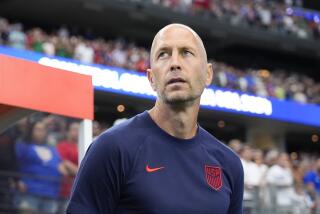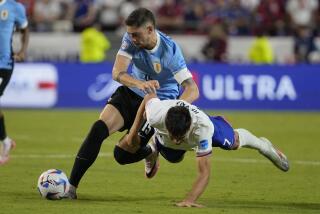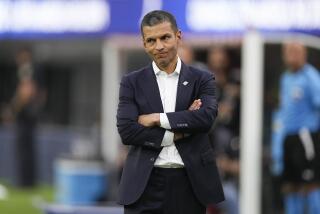World Cup ’94 : WORLD CUP USA ’94 / GROUP C PREVIEW : Suddenly, Last Summer : ’93 Run Under Azkargorta Bolsters Bolivian Pride
- Share via
The transformation came so quickly it was almost difficult to imagine.
Bolivia, World Cup qualifier.
No one in the soccer community thought it possible in January of 1993 when one Francisco Xavier Azkargorta Uriarte arrived in La Paz with a mandate to resurrect the Bolivian national team.
Azkargorta, a chain-smoking Basque who has been a journalist, entrepreneur, sports-medicine specialist and coach who languished in the Spanish leagues for a decade, was something of a mercenary when he arrived in La Paz at the height of the South American summer.
But he was the best Bolivian officials could find in their search for a soccer savior. After all, what did Bolivia have to offer other than the continent’s highest poverty rate and a national soccer program that was a Latin American disgrace.
“(At first) almost no one believed in this national team,” Azkargorta said in March.
But that changed last summer when Bolivia became the surprise of South American qualifying rounds by finishing second in Group B.
That success is seen by some inside this landlocked country of 7.5 million as evidence that Bolivians are maturing politically and economically as well. Once considered one of South America’s most unstable countries, Bolivia is enjoying a revitalization.
Still, Bolivia has the unenviable task of playing its first World Cup game in 44 years in the Cup opener June 17 against defending champion Germany at Chicago’s Soldier Field.
Most give Bolivia little chance of advancing to the second round, considering it is paired in Group C with Germany, Spain and South Korea. Perhaps the best opportunity for a Bolivian victory will come June 23 when the team faces South Korea at Foxboro, Mass. The victor of that game might advance.
A strong showing in the United States, however, would mean much to the country’s pride. The team’s negligible World Cup history has been an undeniable embarrassment. Bolivia was invited to the 1930 Cup in Uruguay and lost to Yugoslavia and Brazil by 4-0 scores. It was invited again in 1950 in Brazil, and lost its only game to eventual champion Uruguay, 8-0.
Bolivia plays a ball-control offense, emphasizing passing over power and speed. This style is imprinted in young Bolivians at the Tahuichi Aguilera Soccer Academy in Santa Cruz, Bolivia.
The team’s best players--Marco Antonio Etcheverry, Erwin Sanchez, Alvaro Pena and Luis Cristaldo are graduates from the school, for youths 5 to 19.
Still, after a joyous ride through the qualifying round, Bolivia has a ways to go. This summer could prove disastrous without Etcheverry, who suffered a serious knee injury last November while playing for his club team in Chile.
Furthermore, hairline fractures have surfaced in the team’s spirit.
Sanchez continued to play for his Portuguese club as Azkargorta tried to fine-tune his team in the final months leading to the Cup. Last spring, two of Bolivia’s leading club teams refused to release players for national-team duty.
“I’m as baffled as Adam on Mother’s Day,” Azkargorta said at the time. “It seems some people don’t realize the importance of the World Cup yet.”
If Bolivia earns any upsets this summer, that could change forever.
More to Read
Go beyond the scoreboard
Get the latest on L.A.'s teams in the daily Sports Report newsletter.
You may occasionally receive promotional content from the Los Angeles Times.






